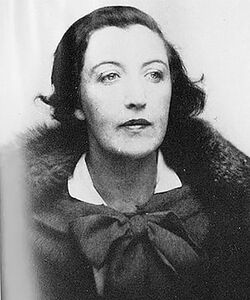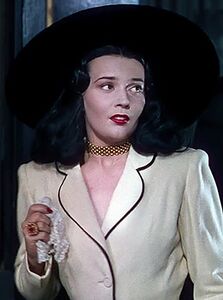Fine arts salon (Gylian Senate): Difference between revisions
mNo edit summary |
mNo edit summary |
||
| (One intermediate revision by the same user not shown) | |||
| Line 12: | Line 12: | ||
Many members were {{wpl|independent politician|independents}}, and thus part of the {{G-NI}} group. Political sympathies varied, from Margot's [[Socialism in Gylias#Social democracy|social democratic]] beliefs to Neira's [[Conservatism in Gylias#Hannaism|Hannaism]]. | Many members were {{wpl|independent politician|independents}}, and thus part of the {{G-NI}} group. Political sympathies varied, from Margot's [[Socialism in Gylias#Social democracy|social democratic]] beliefs to Neira's [[Conservatism in Gylias#Hannaism|Hannaism]]. | ||
The "salon" became one of the best-known groups of the Senate, together with the [[Veterans for a Just Peace]]. They were customarily seated together, near the middle of the chamber. Their combined careers and reputation made them an imposing presence in the Senate, whose interventions commanded attention and public interest. Accordingly, they appeared frequently in televised Senate proceedings, although their career largely pre-dated [[Gylian Television#GTV Parliament|GTV Parliament]]. | The "salon" became one of the best-known groups of the Senate, together with the [[Veterans for a Just Peace]] and the "{{wpl|trench coat}} caucus" of [[Ser Şanorin]] and [[Teisa Rede]]. They were customarily seated together, near the middle of the chamber. Their combined careers and reputation made them an imposing presence in the Senate, whose interventions commanded attention and public interest. Accordingly, they appeared frequently in televised Senate proceedings, although their career largely pre-dated [[Gylian Television#GTV Parliament|GTV Parliament]]. | ||
True to their name, the members devoted their focus to {{wpl|cultural policy}}, and they all served at various points on the [[Gylian Parliament#Committees|Permanent Committee on Culture, Arts and Leisure]]. They continued to lead artistic careers while members of the Senate, taking advantage of the Senate's {{wpl|citizen legislature|popular legislature}} status and use of {{wpl|proxy voting}}. | True to their name, the members devoted their focus to {{wpl|cultural policy}}, and they all served at various points on the [[Gylian Parliament#Committees|Permanent Committee on Culture, Arts and Leisure]]. They continued to lead artistic careers while members of the Senate, taking advantage of the Senate's {{wpl|citizen legislature|popular legislature}} status and use of {{wpl|proxy voting}}. | ||
The heyday of the "salon" overlapped with the [[Golden Revolution]]. Anaïs was the first member to leave the Senate, becoming instead Governor of [[Sváen Region|Sváen]] in [[Gylian regional elections | The heyday of the "salon" overlapped with the [[Golden Revolution]]. Anaïs was the first member to leave the Senate, becoming instead Governor of [[Sváen Region|Sváen]] in [[List of Gylian regional elections#1970|1970]]. Margot said the group never recovered from the deaths of Dæse, Sofia, and Anaïs in 1976–1977. Phaedra narrowly lost election to the [[President of Gylias|presidency]] in [[Gylian presidential election, 1986|1986]], and died in 1989. Margot, Virginia, and Neira were the sole members remaining when the Senate was reformed to be based on {{wpl|sortition}} starting in 2000. | ||
Although she only served two terms in the Senate by presidential appointment, [[Ludmila Canaşvili]] is sometimes considered an "honourary member" of the "salon". | Although she only served two terms in the Senate by presidential appointment, [[Ludmila Canaşvili]] is sometimes considered an "honourary member" of the "salon". | ||
Latest revision as of 08:01, 21 December 2021
The fine arts salon (French: salon des beaux-arts) was an unofficial group of members of the Gylian Senate, known for their simultaneous artistic careers. Their involvement in the fine arts and refined public images made them popular and respected for their dedication to the polymath ideal. Columnist Denise Sarrault described them as "easily among the most brilliant people to have graced the Senate with their presence."
The "salon" was first formed after the 1962 federal election, and had the following members:
- Margot Fontaine (ballerina and philosopher; member for Alţira)
- Dæse Şyna (writer; member for Arxaþ)
- Anaïs Nin (writer; member for Sváen)
- Virginia Gerstenfeld (writer; member for Herlan)
- Phaedra Metaxa (poet and writer; member for Elena)
- Sofia Demes (soprano; member for Elena)
- Neira Tasei (concert pianist; member for Gacar)
Many members were independents, and thus part of the Non-inscrits group. Political sympathies varied, from Margot's social democratic beliefs to Neira's Hannaism.
The "salon" became one of the best-known groups of the Senate, together with the Veterans for a Just Peace and the "trench coat caucus" of Ser Şanorin and Teisa Rede. They were customarily seated together, near the middle of the chamber. Their combined careers and reputation made them an imposing presence in the Senate, whose interventions commanded attention and public interest. Accordingly, they appeared frequently in televised Senate proceedings, although their career largely pre-dated GTV Parliament.
True to their name, the members devoted their focus to cultural policy, and they all served at various points on the Permanent Committee on Culture, Arts and Leisure. They continued to lead artistic careers while members of the Senate, taking advantage of the Senate's popular legislature status and use of proxy voting.
The heyday of the "salon" overlapped with the Golden Revolution. Anaïs was the first member to leave the Senate, becoming instead Governor of Sváen in 1970. Margot said the group never recovered from the deaths of Dæse, Sofia, and Anaïs in 1976–1977. Phaedra narrowly lost election to the presidency in 1986, and died in 1989. Margot, Virginia, and Neira were the sole members remaining when the Senate was reformed to be based on sortition starting in 2000.
Although she only served two terms in the Senate by presidential appointment, Ludmila Canaşvili is sometimes considered an "honourary member" of the "salon".
Gallery
Ludmila Canaşvili
("honourary member")







